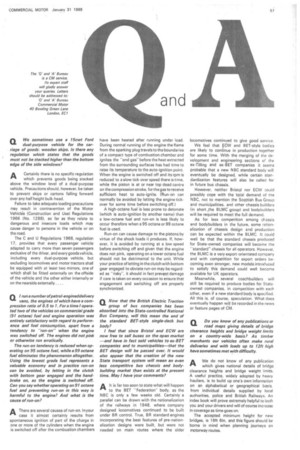Q I run a num ber of petrol-engineddelivery vans, the
Page 59

If you've noticed an error in this article please click here to report it so we can fix it.
engines of which have a compression ratio of 8.5 to 7. Fora time operated two of the vehicles on commercial grade (91 octane) fuel and engine operation was entirely satisfactory with regard to performance and fuel consumption, apart from a tendency to "run-on" when the engine was switched off. The engines did not pink or otherwise run erratically The run-on tendency is reduced when operating on 95 octane fuel, while a 99 octane fuel eliminates the phenomenon altogether. Using the lowest grade fuel represents a valuable economy and in practice run-on can be avoided, by letting in the clutch with bottom gear engaged and the handbrake on, as the engine is switched off. Can you say whether operating on 91 octane fuel and preventing run-on in this way is harmful to the engine? And what is the cause of run-on?
AThere are several causes of run-on. inyour
case it almost certainly results from spontaneous ignition of part of the charge in one or more of the cylinders when the engine is switched off after the combustion chambers have been heated after running under load. During normal running of the engine the flame from the sparking plug travels to the boundaries of a compact type of combustion chamber and ignites the "end gas" before the heat extracted from the surrounding surfaces has had time to raise its temperature to the auto-ignition point. When the engine is switched off and its rpm is reduced to a slow tick-over speed there is time, while the piston is at or near top dead centre on the compression stroke, for the gas to receive sufficient heat to auto-ignite. (Run-on can normally be avoided by letting the engine tickover for some time before switching off.) A high-octane fuel is less prone to detonate (which is auto-ignition by another name) than a low-octane fuel and run-on is less likely to occur therefore when a 95 octane or 99 octane fuel is used.
Run-on can cause damage to the pistons by virtue of the shock loads it produces. lf, however, it is avoided by running at a low speed before switching off and given that the engine does not pink, operating on a lower octane fuel should not be detrimental to the unit. While your practice of letting in the clutch with bottom gear engaged to obviate run-on may be regarded as -risky", it should in fact prevent damage if care is taken on every occasion to ensure that engagement and switching off are properly synchronized.




































































































